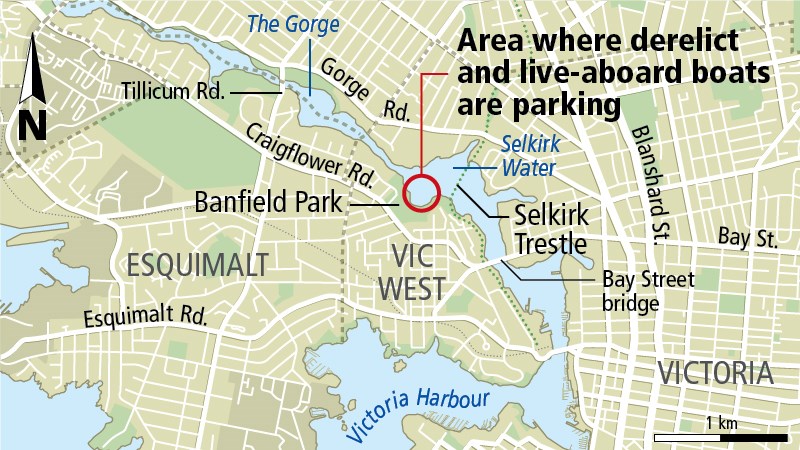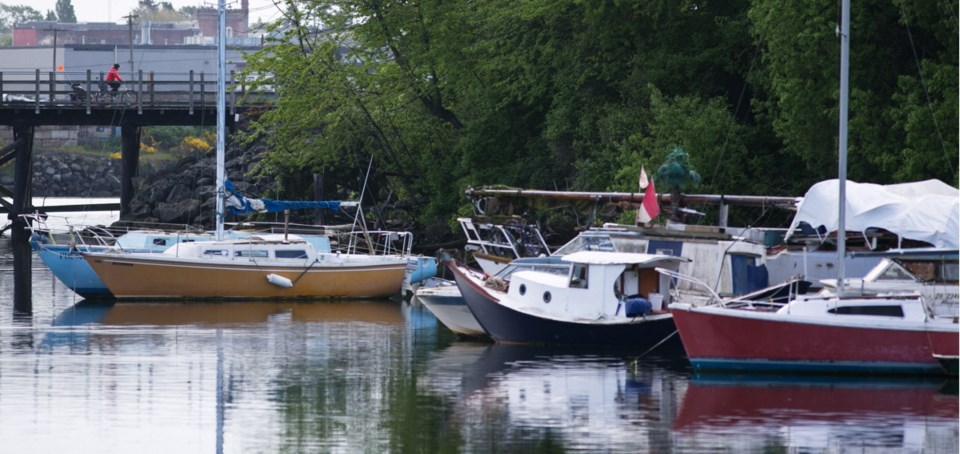Victoria will move forward with a plan to clear out derelict boats and live-aboards from the Gorge waterway near Banfield Park despite concerns about “gentrification” of the waterway.
Councillors have endorsed staff recommendations to ask the province for a licence of occupation and to expedite zoning of the waterway for recreational use only — prohibiting live-aboards or long-term anchoring.
“I have concerns, I guess from the standpoint of social justice and gentrification and affordable boating,” said Coun. Ben Isitt.
“I’m a mariner and I can’t personally afford moorage with any of the facilities operated by the Greater Victoria Harbour Authority or private operators. So I think we have to be cautious in what recreational use looks like.”
Isitt said he supported regulation of the waterway and long-term overnight use but would like to see the possibility of allowing responsible overnight moorage.
“It could actually show that the city respects diversity and a diversity of users, and it could be one stop for people who ply the coast.”
Coun. Lisa Helps said the people using the waterway have brought the regulation down on themselves.
“If there were no problems, if there was no garbage dumped on the shore, if there were no oil leaks, if there were no long pieces of rope impeding people, if there were none of that, we wouldn’t be having this conversation,” Helps said.
“Unfortunately, because of the bad behaviour — and I hate to use those words — of a few people, we have to come in and have this conversation and I think we’re moving in the right direction.”
Finding the best way to deal with about a dozen boats, some derelict, anchored just northwest of the Selkirk Trestle off Banfield Park, has been an issue for the city as residents and other recreational water users have complained that some of the boats are in poor repair and leaking fuel and oil, and boaters are dumping sewage and garbage.

A staff report estimated the licensing and zoning process would take six to eight months with one-time costs for rezoning and signs of about $14,000, and ongoing compliance and enforcement costs (vessel impound, disposal and legal costs) estimated at $112,000.
The Ralmax Group has offered assistance in covering some of the costs associated with vessel disposal, said Rob Woodland, director of legislative services
“We would certainly pursue that with them and that would help decrease the amount of cost related to vessel disposal,” he said.
“Those are the items that are most costly — the potential vessel impounds and disposal and then any associated legal costs that might arise from a challenge to the city’s regulations.”
Part of the problem has been that the waterway is covered by different jurisdictions. The seabed is owned by the province and managed by the Ministry of Lands, Forests and Natural Resource Operations, while the water surface is considered a navigable waterway and is subject to federal navigation and marine habitat regulations.
The province would be willing to consider leasing the water lot to the city, provided the city develops a management plan consistent with the province’s community use and recreation objectives, according to staff.



